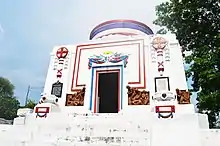Mausoleo de los Veteranos de la Revolucion
Panteón de los Veteranos de la Revolución | |
 | |
| Location | Manila North Cemetery, Manila, Philippines |
|---|---|
| Designer | Arcadio de Guzmán Arellano |
| Type | War memorial |
| Opening date | May 20, 1920 |
| Dedicated to | Filipino revolutionaries of the Philippine Revolution and the Philippine–American War |
The Mausoleum of the Veterans of the Revolution (Spanish: Panteón de los Veteranos de la Revolución or the Mausoleo de los Veteranos de la Revolución) is a memorial and national monument dedicated to Filipino revolutionaries of the Philippine Revolution of the 1890s and the Philippine–American War situated inside the Manila North Cemetery in Manila, Philippines.[1]
History
Early years
The memorial was commissioned through Executive Order No. 87, issued by Governor-General James F. Smith on August 28, 1908.[2] Arcadio Arellano made the design for the monument in 1915 and the Asociación de los Veteranos de la Revolución and the city government of Manila was responsible for the construction of the structure. It was inaugurated on May 30, 1920.[3]
Heritage designation
The monument was declared a National Historical Landmark on April 6, 1993.[3]
Renovation
In October 2018, the monument was repainted with lead free paints by volunteers of the EcoWaste Coalition.[4]
Design
The design of the monument was made by Arcadio de Guzmán Arellano, the brother of Juan Arellano.[2] The neoclassical structure is a massive cubic structure on an elevated square podium. A shallow dome rests on a drum fenestrated by small openings to allow the circulation of air and primarily to let the natural light to come in. Swags, frets with key patterns, and human figures that represent grief to those who died fill up the façade.[2]
Notable burials
- Juan Arévalo, Son of Bonifacio Arévalo. Assembly Member, Declaration of Philippine Independence[5]
- Bonifacio Flores Arévalo, Filipino ilustrado, dentist, sculptor, propagandist, and an ardent patron of music and theater. Treasurer, La Liga Filipina. Founder, Sociedad Dental de Filipinas (now Philippine Dental Association)[5]
- Pio del Pilar, General of the Philippine Revolution[5]
- Former
- Melchora Aquino, Grand Woman of the Katipunan, gave medical attention and encouraged the revolutionaries. Remains were later transferred to the Tandang Sora National Shrine in Quezon City.[5]
- Marcelo del Pilar, Filipino writer, lawyer, journalist, and freemason. One of the leaders of the Propaganda Movement. Remains were transferred to Marcelo H. del Pilar Shrine in Bulakan, Bulacan.[5]
References
- ↑ "Our Heritage and the Departed: A Cemeteries Tour". Presidential Museum & Library. Archived from the original on 28 September 2015. Retrieved 4 November 2018.
- 1 2 3 Lico, Gerard (2008). Arkitekturang Filipino: A History of Architecture and Urbanism in the Philippines. Quezon City: The University of the Philippines Press. p. 289. ISBN 978-971-542-579-7.
- 1 2 Mousoleo de los Veteranos de la Revolucion (Marker on facade) (in Filipino). Facade of the Mausoleum of the Veterans of the Revolution: National Historical Institute (Philippines. 1993.
- ↑ "Environmental advocates appeal to the public not to turn cemeteries into garbage dumps". Philippine Information Agency. 29 October 2017. Archived from the original on 5 November 2018. Retrieved 4 November 2018.
- 1 2 3 4 5 Nazario, Glendale (29 October 2017). "Manila North Cemetery one of the oldest, biggest cemeteries in Metro Manila". Manila Bulletin. Archived from the original on 5 November 2018. Retrieved 4 November 2018.